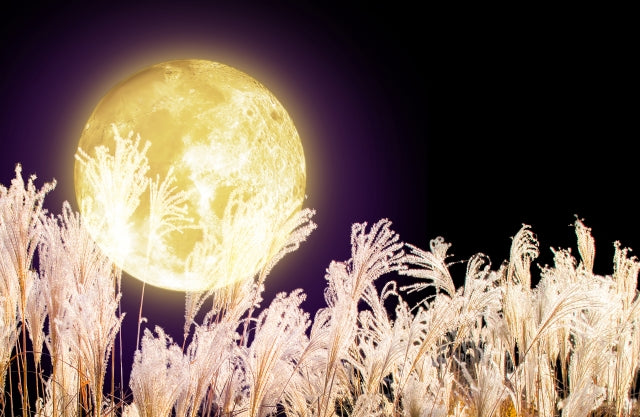
The Harvest Moon: A Moment to Reflect and Connect with Nature
The Harvest Moon and Japanese Traditions
In Japan, we celebrate the Harvest Moon (known as Chushu no Meigetsu) as a way to honor the beauty of nature and give thanks for the harvest. This tradition, called Otsukimi, is all about taking a moment to appreciate the full moon with family and friends, while offering gratitude for the bounty of the earth. A key part of this celebration is decorating with susuki (pampas grass), which serves both as a protective charm against evil and as a sacred object to welcome the gods.
Interestingly, susuki looks like rice stalks, which is why it is used as a symbol of abundance. Although the rice hasn't yet ripened during this season, people display susuki to express their hope for a good harvest and their appreciation for the natural cycle.
Moreover, the act of decorating with plants has deeper meaning in Japanese culture. It’s a way to cleanse and purify the space, inviting positive energy and driving away negative influences. The practice of tying plants together, creating knots, is also symbolic—it represents the connection between people, nature, and divine forces. In Japan, "tying" carries a spiritual meaning of unity, whether it's between people, nature, or even between the human heart and the natural world.
A Cross-Cultural Look at the Moon
Both in the West and the East, the moon holds a special place in people’s hearts. In Western cultures, the moon is often seen as a symbol of change and emotions. It’s linked to goddesses like Artemis in Greek mythology or Diana in Roman stories, representing femininity, the hunt, and nature. The moon also plays a key role in Western astrology, where it’s seen as influencing our emotions and subconscious.
In the East, particularly in Japan and China, the moon is more about harmony and natural cycles. It symbolizes the gentle, reflective side of life, known as yin in Chinese philosophy. The moon, with its soft light, is a reminder of balance and the quiet moments that bring peace to our lives. For us, the full moon during Otsukimi is not just about looking at the sky but feeling connected to the world around us, and even the universe itself.
Why the Harvest Moon Matters Today
In today’s fast-paced world, we often forget to pause and reconnect with nature. The tradition of Otsukimi is a perfect opportunity to do just that. By decorating with plants, gazing at the full moon, and giving thanks for the natural cycles, we can step away from the noise of modern life and find balance again. It’s a time to cleanse our minds and hearts, just as our ancestors did, and feel grateful for the abundance around us.
Even though the world has changed, the essence of connecting with nature remains timeless. The moon, whether it’s seen through the lens of Western mythology or Eastern philosophy, reminds us that we are all part of a greater whole. We share this earth and these natural cycles, no matter where we come from.
Tonight, Look to the Full Moon
On this Harvest Moon night, take a moment to look up at the sky and admire the beauty of the full moon. Let its light wash over you, even if just for a moment. Feel connected to something larger than yourself, something timeless. In that fleeting moment, you might find the peace and gratitude that our ancestors celebrated under the same moonlight.
